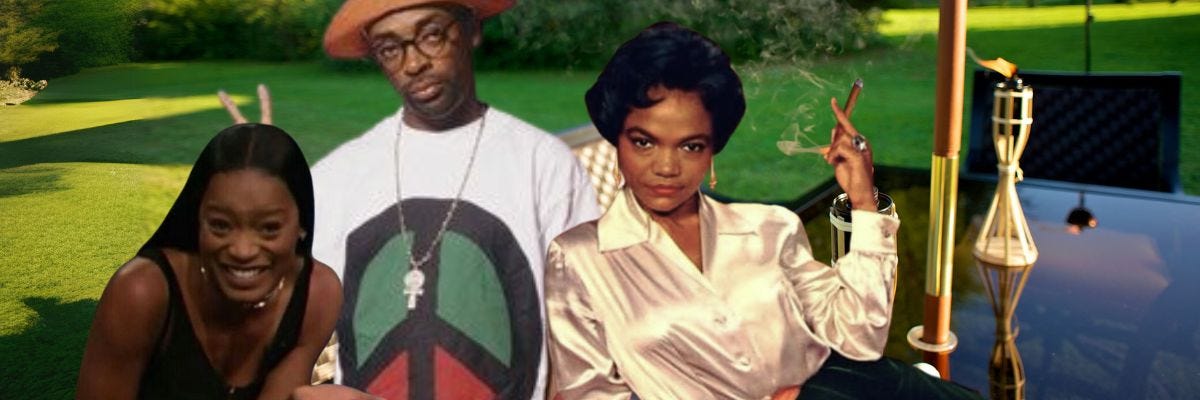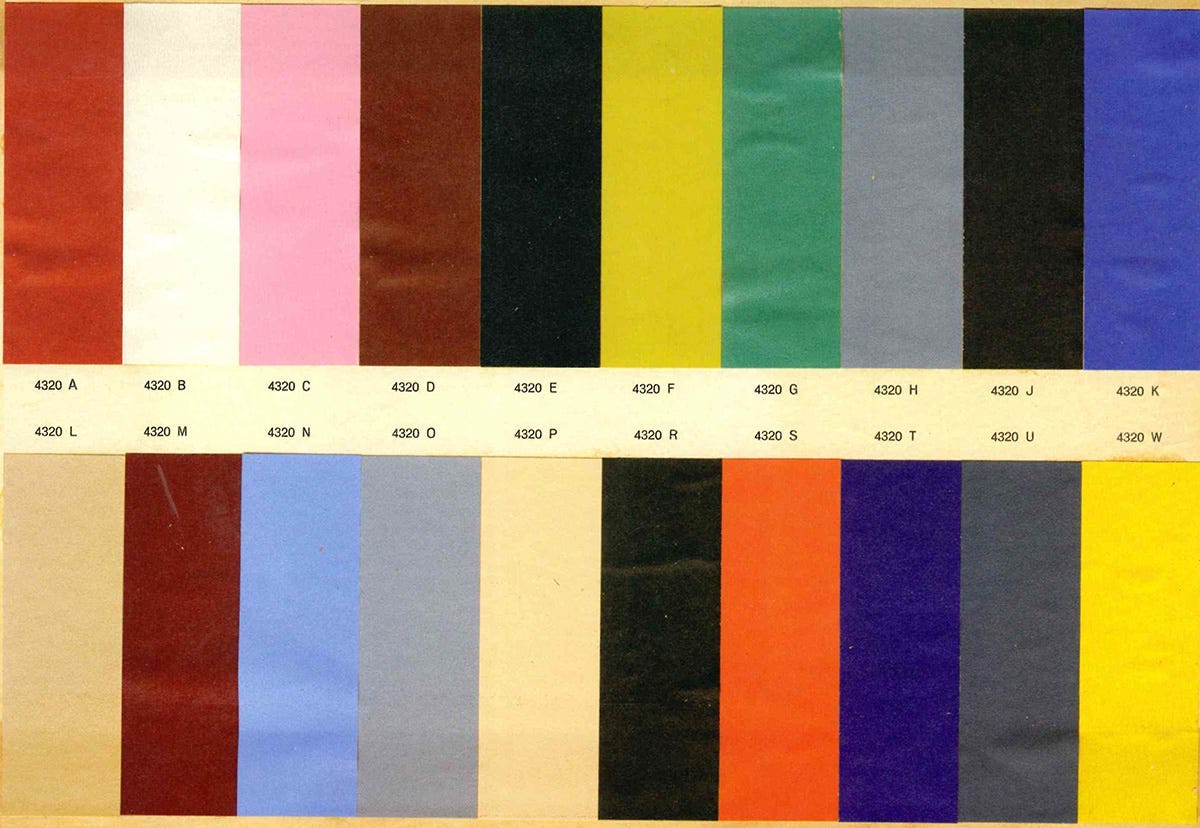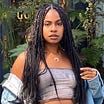Pro tip: If you like to listen to music while you read, click here to be redirected to the playlist made just for this article. Then scroll back up & get your read on.
To know
is to witness someone in an era of expressive evolution—observing, archiving, and reinterpreting the world through music, film, and thought-provoking excerpts. She moves with intention, and her work reflects that same energy: a blend of research, reflection, and raw creativity. Her work feels like an offering—an invitation to look closer, to think deeper, to connect the dots.Ra and Blacks of Are.na go waaaay back. See, she was around back when we launched our group-chat via Geneva. Thank goodness I came to my senses and finally embraced Discord… Thank goodness she never left our side. She really is one of those people who makes a space feel richer just by being in it, always bringing sharp insights and wit every time we link up.
After she co-hosted our January screening of “The Watermelon Woman”(2024), I sent her the questionnaire for this interview and my girl was on it! As I read through her answers, I realized that her answers were only the tip of the iceberg when it came to capturing a snapshot of her essence. —I needed to hear her thoughts in real-time. So, we hopped on a call.
What follows is a layered conversation, woven from our dialogue and her original reflections—an entry into the mind of someone truly worth knowing.
TW: Mental health, BP, hallucinations
11:08 AM CST Tuesday, 3/9/25 Incoming call from Chicago to Providence…
D: Name/Alias? (Pronouns?)
R: Andra Danielle Lee. I could just go by Andra but some people call me Ra. That's what I like to be called.
Ra (She/Her)
D: ASL? (Are.na, Socials, Location)
R: Are.na: Ra Lee
Socials: Youtube, Substack, Instagram, Website
[Music streaming: BandCamp]
Providence, RI, USA
D: What's the coolest thing you want people to know about you?
R: The coolest thing about me is that I'm feeling mentally well and can see so much clearer… I have bipolar disorder and was diagnosed with it a very long time ago back in like 2013. I struggled with it for such a long time and it really hindered a lot of my progress, but after getting a lot of medical care and trying different medications, I'm finally treated and have been stable for four years now.
So I think that's probably the coolest thing about me. That I haven't been in to a mental hospital in four years and I feel like I'm finally able to see my life with clear eyes and start on projects that I've wanted to do basically my whole life…
D: I’m glad you are feeling more stable than before! The path to get to where you are today must have felt frustrating in ways.
R: I think, when it comes to your mental health, you really have to encourage people to do it for themselves because going through that process of getting treatment and finding treatment can be so long and painstaking. You really have to do whatever you feel is the best for you to be the best person you can be. Like the most functioning person you can be. Literally.
So I feel like it was just a win for me that I can come to terms with having to take medication all the time. Doctors have told me for so long that it's basically like having a heart condition… (you know if you have a heart condition, you gotta take daily medication for it)… I was just like, 'but it's so mental' -must be something I can overcome by myself… And now I know that, for me at least, that is not the case. So I definitely feel proud about that, and feeling good about where my health is at today.
D: Thank you for being so open about your journey with bipolar disorder—it’s incredibly valuable for our community.
Mental health so stigmatized in Black families, [I feel] partly because our elders, understanding some of the societal challenges awaiting us, may see it as an added burden. When struggles aren’t visible or familiar, they can feel like threats rather than something to support or even talk about. As a result, mental health often gets neglected and becomes taboo, with many of us feeling pressured to always appear “normal” and perfect.
R: When it comes to bipolar disorder or whatever mental illnesses you have these illnesses warp our reality so for the person who's experiencing that warped reality doesn’t even know that that's not really reality… It's also hard for people who have never had that experience to put a finger on what that feels like. So people really struggle to get medicated because someone is telling them they need medication for something, but what they're telling them they need medication for is not something that the person really relates to… Like if the person usually has hallucinations or hears voices but they don't recognize that those voices are are not supposed to be there…
-does that make sense?
D: It makes it makes perfect sense. I just a part of the way your life has been.
R: Yeah, exactly. You're just so used to it and I didn't realize until someone spoke to me about some of the side effects. Like, “are you seeing things? Do you have visions? Do you hear voices that are not your own?”… It took me a while to really answer that question, because I was so accustomed to it that I didn't even really hear it as like a third party. It was just a part of me.
I have a vivid mind. My thoughts are always there. It [the medication] gives me more of a break from that consistent and incessant thought. Those intrusive thoughts about the world, how bad it is, what I can do about it, or even thoughts of grandiose levels of thinking.
So, I mean, I could talk about this forever, but it's one of those things that I'm glad to be able to talk about. It can be on a different scale for everyone, but I think primarily people who have bipolar disorder can feel like [there’s something] a bit different about them, but they can't quite pinpoint what that is until they get the help they need.
D: I'm curious, in your life, where is your favorite place to unplug? And I mean, truly unplug. Zero devices.
R: My parents have this nice little deck in their backyard and I grew up out there doing arts and crafts and activities. I have so many fond memories of just being out there and hanging out in the summer. That is my favorite place to go and I literally don't have to bring my phone. I'm usually just smoking a little weed and listening to the birds and it's just so relaxing. Even if it's like five minutes that I'm out there, I just feel so refreshed every single time. So that's definitely a sanctuary for me.
D: Let’s talk about your practice… Do you consider yourself an artist first?
R: I would say that I'm an artist first, for sure.
D: What moves you in your art? What has really called you to create?
R: Um, that's a really good question. I think what calls me to create is a lot about sharing history, sharing like culture and stories that people can relate to. I find myself creating documentaries and video essays sometimes and um, media that people can consume and come out learning something.
I do these monthly factoids on my YouTube channel where I, I do a brief dive into women in music and we'll take like one album that they've done and I'll just go into the stats of the album and what impact it had. Did it reach the Billboard one hundreds? Did it get a Grammy? What was their strategy surrounding the album for getting it out and marketing it?
I mostly focus on Black women artists and people who are unknown or… under-known, I guess. It helps me to frame my work in a, in a form of being someone that people can, um, reflect on… like a record, like a ledger of the culture.
D: I remember during AFROCONNECTION→ last month, you shared that you write and record music. Is that a hobby of yours or would you consider it the forefront of your practice?
R: It is at the forefront of my practice. I would say that I sit down at my keyboard and I pull up my laptop to record songs every day. I don't publish as often as I record. So I would say I'm like in the act of making the art very frequently, but publishing less frequently. There's a lot of music files that I have, that I haven't released but it's all about that progress and that art of producing really feels really good to me.
MEDIA + CULTURE
Cinema Club
D: What is your relationship the films you curated for Cinema Club in December?
R: All of the films I curated I feel have a common thread of focusing on identity. While “Boomerang”[(1992)] is hilarious it also seriously focuses on sexuality and intimacy and how it's connected to our identity. “School Daze”[(1988)] focuses on identity and stereotypes within the Black culture specifically of those who are light skin and dark skin and really how we exist in many shades. “B.A.P.S”[(1997)] focuses on our identity as it relates to money and wealth and how far we might go to get it even if it takes us miles from home. And lastly The “Watermelon Woman”[(1996)] which focuses on lesbian identity within Blackness. All of these films helped me to see my identity more fully because they allowed me to reflect on my own preferences, skin tone and sexuality.
D: What film were you secretly rooting for in the polls? Why?
R: I was secretly rooting for “School Daze”[(1988)] but, I'm so glad the community went with “The Watermelon Woman”[(1996)].
Fill In the Blank
D: What experience do you recommend everyone experience at least once?
R: I definitely think everyone should go clubbing at some point. I feel like Gen Z and Gen Alpha, they don't have as many opportunities to go to clubs. I feel like the clubs are not like you see in Nelly's, Hot In Here. So, I feel like I wish I definitely think everybody needs to go to a club and preferably probably something in like Europe, like Spain or France or something like that, because you would have a blast. I feel like everybody needs to just like definitely tear up, sweat it out in a club, you know, have a little few drinks, do whatever you're going to do. If you've never gone, you got to go. Yeah… The club is a portal.
I honestly think iPhones and everything changed the game of clubbing because people just are more selective now where they go clubbing instead of like stumbling into a random bar. So I'm just like, no, we got to stumble more guys who really just got to go to these random bars and places and clubs and have a great time.
Find some clubbing bangers and more in the playlist made in partner with Ra, inspired by the content of this interview and Ra’s personal taste.
D: Anything inspiring you lately?
R: Oh, I honestly think the, Blacks of Are.na club has been so inspiring. I've been going through sometimes and checking through like some of the old AFROCONNECTION→ [channel] and the past times that we've had Cinema Club… I've been going back and even looking through who is a part of the Are.na and seeing who follows the Substack. Cause like, I always love to be connected to Black people as much as possible.
D: That honestly just makes my heart swell up so much. Thank you so much. I'm happy that you feel we're providing something to your life and it's been a positive experience.
R: It definitely has. It's definitely become a part of my daily when I'm going on Are.na. I'm like, if I see something from Blacks of Are.na, I'm definitely going to be checking it out. I also think that you guys have, you and
, are working really well together. Kudos to y'all. That's hard to do sometimes.D: Man, I appreciate your kind words. It has been challenging with our timezone differences and just balancing regular adulting stuff…
Okay… Okay… Enough about us. Back to you! Dream ___________?
R: Blunt rotation…
D: Hehehe. Dream blunt rotation?
R: I definitely would say Eartha Kitt has to be there with me for sure. I would just love her to be on the blunt rotation. She was hilarious, so I would love to see that. Um, you know, Keke Palmer as well would be really great. Just her and her interactions with Eartha Kitt. I think that would be fantastic. Um, and who else...? You know, probably Spike Lee. Let's add him in there. Okay. That would be my three. Okay. I'll keep it at three.
D: What an exciting blunt rotation. I feel like all of the strong femininity in that space would totally roast the hell out of Spike.
R: He'll have like one or two good points and then the rest of the time he's getting roasted.
D: What creative resource do you recommend people check out?
R: The architect Le Corbusier. Have you heard of him? He's a very old architect, like the 1800s. He died in the 1960s, but he has this color keyboard that he developed where you can… basically he selected all these colors that work together no matter what. I've used his color keyboards to design. If I'm struggling at what to make or what colors to use, I use his color keyboard for that. Um, but it is really harmonious. Every time I pick any colors on there it's just perfect. So I'm definitely, I would definitely say that as a resource I would love to share for people.

And there's been so many people who have used that keyboard to like make products. Like I think the linen company or a fabric company, Tekla, they make towels and stuff too, but they use his color keyboard to make like some of the dyes for their fabrics. But yeah, he's used quite a bit and he's a really amazing architect. If you ever want to look at his work, his stuff is really cool.
D: What have you been listening to recently?
R: Yeah. I definitely think I have one thing that I listened to. Well, well I have two and they're both podcasts. One is called Naked Beauty Planet. It's run [and] hosted by a Black woman (Brooke DeVard)! I think she's done this podcast for 10 years now, but she's talked to so many men and women about their beauty routines. People who are professionals in the space who work for companies like Paula's Choice. So she's talks to them about the products that they've created, how they created those products, and what they use for themselves for self-care. It's just opened my eyes to what not to put on my face, because I am not a really a beauty girl. I'm not really a girly girl.
It's been really interesting to listen to that show over the years and get so many tips. She asks the same question at the end of the podcast. She asks, “what makes you feel the most beautiful“ or “when do you feel the most beautiful?” and people answer that question in so many various ways. I'm always so inspired by their answers or just like thrilled to do more self-care at the end of it.
The second one is, Friends and Family with Aurora James. Aurora James runs this company called 15% Pledge. We [Black people] make up like about 15% of the population. So there should be 15% of us on the shelves at minimum. And, um, she does that, but she also does this podcast… She did it through the month of February where she interviewed five people who are entrepreneurs and who are extremely successful in that space. Exit plans for their business, came up in one episode... So it's, it's been really eye-opening for me in terms of business and it's definitely been interesting to listen to that one and get some more insight on how people operate their businesses. How Black people specifically started their businesses.
ARE.NA + B.O.A.
D: How would you describe Are.na?
R: A really great organizational tool. You can organize your thoughts, you can organize your images, you can organize your research and organize your friends. So I think it's a really great, social organizing tool. Um, yeah, that's what I would say.
D: Go to your Are.na and sort out your blocks by random. What’s the first thing that comes up?
R: y Project via Ra Lee’s channel, “Ch. 4 Fashion Fashion”
D: Any channels from the B.O.A. index channel speak to you?
R: Let me see if I can find it. Let me find it real quick. Yeah, this is a newer one that I just found, but I really do love this Are.na. Um, it's called “All Black, Everything”. Okay. And it's by this woman, Lisa Marie.

D: If you could live in an Are.na channel by any user which one would it be?
J: “Ch. 99 Off Planet” by Ra Lee

D: What channel of your own creation are you most compelled to share?
“Ch. 99 Punk Futurism” by Ra Lee
R: It's mostly about Black people's contribution to punk. I was doing a lot of research about just visual research. And I was coming across so many images that I love that were, that were, you know, just really edgy and punk. I was just like, there's so much of a Black contribution to punk that I don't feel like it's talked about. Just punk visuals but it's always done in like a futuristic kind of way… Pushing the needle a bit. Um, and I think that. We have like people like Teezo Touchdown. I don't know if you know who that is… but when I see him, I'm like, he's the embodiment of Black punk, punk futurism and all of that.
D: What’s the most common thread you believe is shared between yourself and other members of this community?
R: I would say a curiosity. I think everyone on Are.na is really curious about discovery and exploration and just wants to involve those things in their life. So I think that this group is probably like a group of explorers and a group of people who know how to hunt down information.
D: People should tap in with you if…?
A: If they want to feel good about themselves, I'm such a good cheerleader. So if you ever are on my Instagram [@therealandralee] stories, I do these daily messages where I'm just like, you know, “It's a beautiful day in the life of me and I hope it's a beautiful day for you too…” And then we just like, get into what I'm doing for the day. If you ever need motivation or positivity, I'm your girl.
Conversations like this remind me why storytelling matters. Ra’s journey—through art, through mental health, through documenting the culture—is a testament to what it means to see and be seen. Her work serves as both archive and mirror, helping us better understand ourselves and the world around us. If anything from this conversation resonated with you, let it be a nudge to dive deeper into her work and, more importantly, to create space for your own stories to be told.
Ra has been part of our community long before this interview, and if you weren’t familiar with her before, you definitely are now. Whether it’s music, film, or deep-cut cultural analysis, she brings a unique and necessary perspective to the table. If you want more, go tap into her work, follow her channels, and, of course, drop into Blacks of Are.na to keep the conversation going. Big love to Ra for sharing her time and thoughts—this won’t be the last time we hear from her.
Next month, we’ll chop it up with B.O.A. member and artist,
(https://www.are.na/jazsalyn/channels) Artistic Director of Black Beyond for another inspiring and insightful conversation. Stay tuned!Until next time, keep building, keep sharing, and keep connecting.
, B.O.A. President



















